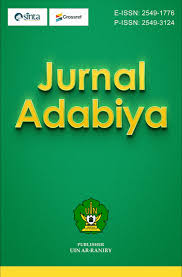References
Abubakar, AY (2020). Implementation of Islamic Law in Aceh as an Asymmetric Special Autonomy (History and Struggle) (MH DR. EMK. Alidar, S.Ag. (ed.)). Aceh Islamic Law Office in Collaboration with CV Printing. Rumoh Cetak. http://scioteca.caf.com/bitstream/handle/123456789/1091/RED2017-Eng-8ene.pdf?sequence=12&isAllowed=y%0Ahttp://dx.doi.org/10.1016/j.regsciurbeco.2008.06.005%0Ahttps://www.researchgate.net/publication/305320484_CENTRAL_PREVENTION_SYSTEM_STRATEGY_TO_SUSTAIN_THE_STATEMENT_OF_THE_CENTRAL_PREVENTION_STRATEGY
Asman, A. (2020). Women's Rights and Obligations in the Perspective of Islamic Law. Borneo: Journal of Islamic Studies, 3(2), 1–16. https://doi.org/10.37567/borneo.v3i2.259
Budiawati, AD (2018). The Rule of Flight Attendants Must Wear Hijab in Aceh Highlighted by Foreign Media. DREAM.CO.ID > DINAR. https://www.dream.co.id/dinar/di-aceh-pramugari-harus-berkerudung-1801316.html
Darmalaksana, W. (2020). Qualitative Research Methods of Literature Study and Field Study. Pre-Print Digital Library UIN Sunan Gunung Djati Bandung, 1–6.
Husda, H. (2016). Islamization of the Archipelago. Adabiya Journal, 18(2), 17–29.
Husda, H. (2019). Reconstruction of the History of National Awakening. Adabiya Journal, 21(2), 31–45. http://scioteca.caf.com/bitstream/handle/123456789/1091/RED2017-Eng-8ene.pdf?sequence=12&isAllowed=y%0Ahttp://dx.doi.org/10.1016/j.regsciurbeco.2008.06.005%0Ahttps://www.researchgate.net/publication/305320484_CENTRAL_CONSTRUCTION_SYSTEM_AND_STRATEGY_TO_SUSTAIN_THE_STATEMENT_OF_THE_CENTRAL_CONSTRUCTION_SYSTEM
Husna, N. (2017). Criminal Law Between Application and History. LĒGALITĒ. Journal of Islamic Legislation and Criminal Law, II(01), 74–94.
Idris, M., & Amalia, DR (2022). Islamic Shari'a and Traditions in Aceh Darussalam. Formosa Journal of Social Sciences (FJSS), 1(1), 11–24.
Manan, A. (2020). Acceptance of the Implementation of Islamic Sharia Laws in West Aceh, Indonesia. KnE Social Sciences, 2020, 615–627. https://doi.org/10.18502/kss.v4i14.7919
Manan, A., Gunawan, & Muhibbuthabry. (2020). Reality and public perception of the implementation of Islamic sharia laws in Banda Aceh. Taylor & Francis Group, 978-0-367-(978-0-429-28998–9), 183–186.
Manan, A., & Salasiyah, C. I. (2021a). Evaluating the Implementation of Sharia in Aceh, Indonesia (Examining the Qanun Jinayat in Bireuen Regency). Jurnal Ilmiah Peuradeun, 9(3), 549. https://doi.org/10.26811/peuradeun.v9i3.593
Manan, A., & Salasiyah, C. I. (2022). "Implementation of Islamic Sharia Laws in East Aceh: The Acehnese Perspectives". Journal of Contemporary Islam and Muslim Societies, 6(2), 149. https://doi.org/10.30821/jcims.v6i2.11615
Manan, A., Salasiyah, C. I., Kamarullah, & Tathahira. (2023). Education and Social Constructions of the Sharia Implementation in Aceh, Indonesia. MIQOT: Jurnal Ilmu-Ilmu Keislaman, 47(1), 43–66.
Manan, A., Wirianto, D., Fadhilah, MA, & Kamarullah. (2023). Halal Tourism: a Proposed Sharia Model for Implementation. Peuradeun Scientific Journal, 11(1), 81–100. https://doi.org/10.26811/peuradeun.v11i1.784
Manan, A. (2021b). Metode Penelitian Etnografi. AcehPo Publishing.
Manan, A. (2015). Metode Etnografi dalam Dimensi Metodologis Ilmu Sosial dan Humaniora Jilid 3. Lhee Sagoe Press - Fakultas Adab dan Humaniora UIN Ar-Raniry.
Rahman, A. (2020). Islamic Sharia-Based Governance System in Indonesia (Case Study of the Implementation of Qanun Jinayat in the Aceh Provincial Government). KAIS: Social Science Studies, I(2), 91–107.



